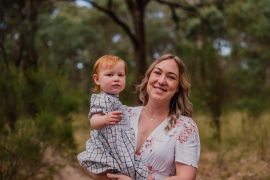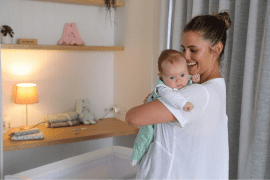Many parents hardly notice when their babies rouse – they adjust covers, shift position, latch and drift off again without fully waking up. If this works for both you and your little one, there’s no need to change anything. But if frequent waking is disturbing either of you, Sweet Sleep has some great ideas on ways to “nudge” a baby into sleeping longer.
Try nudging
There isn’t much nudging that can be done in infants under six months old, but there are a few things to try. Breastfeeding more often during the day sometimes helps, especially in the evenings when babies often naturally cluster feed as they “tank up” for the night. Sleeping skin to skin – opening your shirt and cuddling bub close wearing just a diaper, or laying a hand on baby’s bare back – can encourage longer sleep sessions. Even just being held by an adult, whether it’s a contact nap with mum while she watches a movie or a snooze in an infant carrier as grandpa vacuums the floor, often stretches out the zzzs.
After about six months old, there are a few more “nudges” to try.
Getting baby outside each day for some exercise and sunlight can encourage more restful sleep at night, even when it’s cold and overcast.
Take a lesson from Scandinavian parents, who bundle up their infants in all kinds of weather for naps outdoors after a brisk walk in a stroller or pram.
A short bedtime routine, hopefully done as part of an evening wind down for the whole family (see Bedtime is Overrated), can include a relaxing massage if baby enjoys it. If bubs falls asleep before you, dream feeding (basically latching babe on in their sleep) right as you are turning out the lights and heading for slumberland yourself can stretch out your child’s first sleep interval.
Baths are traditionally done in the evening, but if they are stimulating rather than relaxing for your child, move it to a different part of the day. You may want to add Epsom salts to baby’s bath – magnesium is absorbed through the skin and can help calm restlessness.
Things to check
Anemia can also contribute to restless sleep, so have your child’s iron levels checked if he or she thrashes about and can’t seem to get comfortable. If babe sleeps with their mouth open (especially if they snore), check with your doctor in case sleep apnea could be keeping baby up or see an IBCLC if you suspect a tongue tie.
Allergies are another common culprit and sometimes eliminating certain foods or taking up carpet (in the case of dust allergies) can be helpful. Teething, reflux, colds and ear infections also keep babies awake at night. This quiz is a quick way to discover these and other possible reasons for sleep disturbances so you can follow up with the right health professional.
One frequent frustration for parents is the baby who wakes up in the middle of the night and simply refuse to go back to sleep for an hour or two – or even more.
This is especially common between the ages of six and twelve months. Children are busy practising new skills during this period – no time for sleep!
Two shift sleeping
They also may be doing two shift sleeping, something that was once typical for many of us. When mine were little, I played dead (we had a floor bed in a childproof room) – they babbled and played (and yes, would head butt me and stick their fingers in my nose) and eventually went back to sleep while I did my best to snooze. Keep your eyes closed and model sleep with lots of turning over, grumbling and saying shhhh.
Sleep patterns in babies – shorter sleep cycles, a larger percentage of light sleep – become more adultlike as your child grows, but this happens for each individual on his or her own timeline. Often parents expect toddlers over one to stop waking at night, but many still wake well into the second and third year of life. We will explore this in Part Two.
Sweet Sleep by Diane Wiessinger, Diana West, Linda J. Smith, and Teresa Pitman
Safe Infant Sleep by Dr. James McKenna
Originally published here.
Mary Francell is a board certified lactation consultant (IBCLC) in private practice in Washington state, USA. She and her husband are the parents of three grown children. Mary founded and administers the Biologically Normal Infant Sleep group on Facebook and is an occasional guest host on the Untaming podcast. She has been a La Leche League Leader for over 25 years and currently serves as the Associate Area Professional Liaison for LLL of Washington state. Find out more on her website whatdobabiesneed.com and follow her on Facebook.










